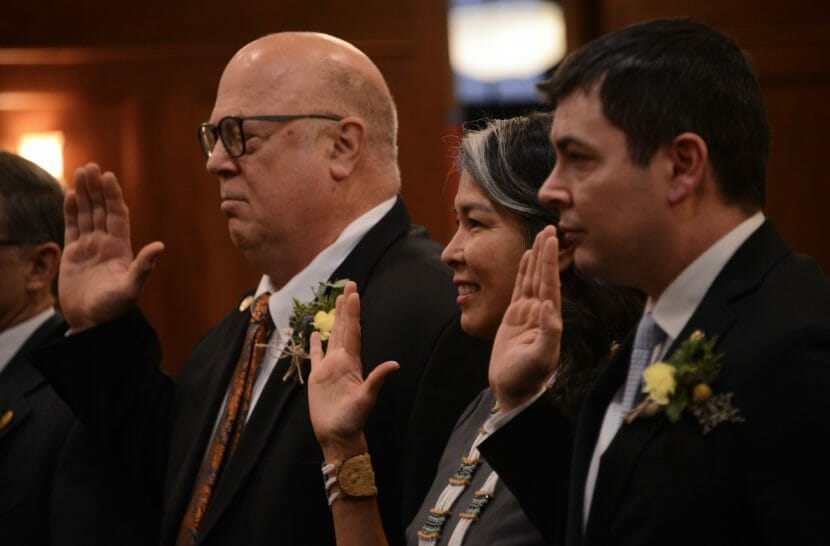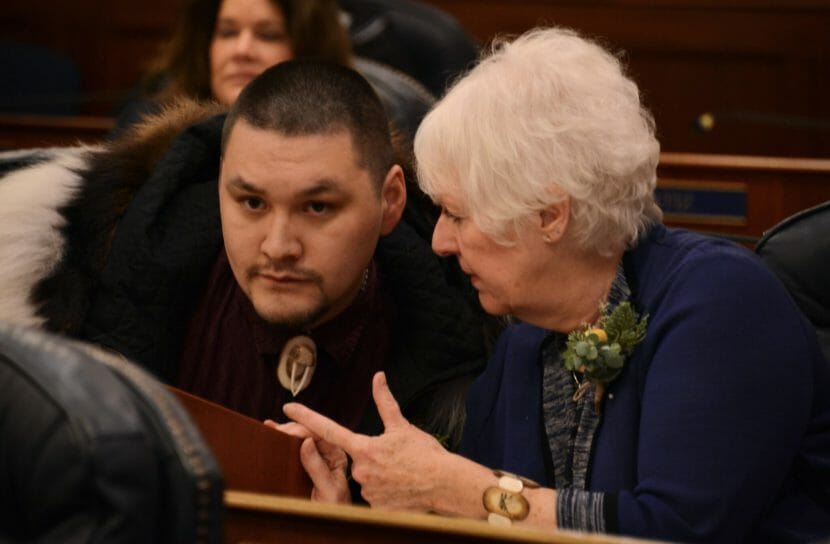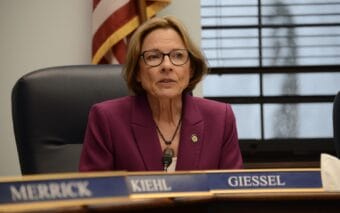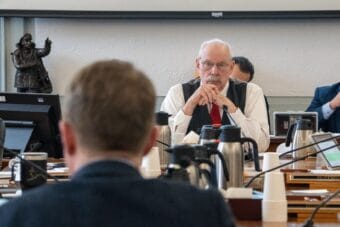
A closely divided Alaska House of Representatives stalled on Tuesday, the first day of the 33rd state Legislature and adjourned for the day without choosing a speaker of the House.
The 20-member Senate is controlled by a 17-person bipartisan supermajority, and legislators were sworn in Tuesday without incident, except the unexplained absence of Sen. Mike Shower, R-Wasilla, a member of the three-person minority.
The Senate’s organization was previously announced in November, and the supermajority uneventfully elected Sen. Gary Stevens, R-Kodiak, the Senate president.
“We will most certainly find areas of differences, but we know that we have to work together to accomplish the enormous tasks and challenges ahead of us.” he said, after assuming the Senate president chair on the dais.
No such announcements took place in the House, whose members were uncertain what would happen after members took their oaths of office.
For the past two years, the 40-member House has been governed by a 21-person multi-partisan coalition, but the results of November’s general election made control uncertain.
It’s the third consecutive time that the House has begun in a deadlock; in 2019 and 2021, the House spent weeks without a permanent speaker. Those deadlocks left the House unable to consider legislation and slowed the pace of work on a variety of projects.
The House deadlock “doesn’t have much impact on us,” Stevens said of the Senate, which is preparing to hold committee hearings on a variety of topics. “In the meantime, if they are not organized, we can at least begin the work – not to tell them what to do, but to help them have a leg up when they do make an organization and get that together.”
Speaker vote possible Wednesday
Though registered Republicans hold more than half the seats in the House, their ranks include Rep. Louise Stutes, the Kodiak Republican who has been speaker of the House for the past two years, and Rep. David Eastman, the Wasilla Republican accused of disloyalty to the United States because of his membership in the Oath Keepers organization.
Stutes and Eastman have thus far been excluded from the Republican caucus, members said, though they have participated in some negotiations separately.
That leaves 19 Republicans in a caucus, two shy of the minimum needed to elect a speaker.
On the opposite side of the aisle is the former coalition majority, which includes 19 members if Stutes is excluded and Rep. Josiah Patkotak, I-Utqiagvik, is included.
Republicans have been courting Patkotak and on Tuesday successfully nominated him as speaker pro tem — an interim leader with limited powers.

Members of the coalition have been doing some courting of their own. They unsuccessfully nominated Rep. Justin Ruffridge, R-Soldotna. Patkotak was elected before a vote on that nomination could take place.
Immediately afterward, the House voted to adjourn, but not before a pair of votes that illustrated its close divide.
Rep. Andy Josephson, D-Anchorage, proposed adjourning until Thursday afternoon, saying afterward that it’s unlikely the House will have a solution to its deadlock tomorrow.
“The odds that in 18 hours, after sleeping the night, that we’re going to be in a productive place to move forward … are unlikely,” Josephson said.
Members of the Republican caucus disagreed, and by a 21-19 margin, they voted to adjourn until 10 a.m. Wednesday.
Joining the Republican caucus in support of the vote were Patkotak and Eastman. Some members of the Republican caucus have said that as long as Eastman is the deciding vote, they are uncertain about their control.
In 2018, Republican members of the caucus believed they had Eastman’s vote in favor of Rep. David Talerico, R-Healy, and held a news conference to announce a new House organization headed by Talerico.
Eastman would have been the group’s 21st vote, but Rep. Gary Knopp, R-Kenai, withdrew from the group after learning that Eastman’s support was not unconditional. Eastman later voted in favor of Talerico, but Knopp’s withdrawal led to the failure of Talerico’s nomination, and a coalition majority took control of the House.
Members of the current Republican caucus, granted anonymity in order to speak candidly, have said they believe Eastman was to blame for that 2018 failure.
Rep. Cathy Tilton, R-Wasilla, declined to discuss Eastman’s involvement but speaking generally about the lack of a Tuesday vote for a permanent speaker, said, “I think there’s still a few details being worked out.”
Education is a Senate priority
Meanwhile, the Senate majority outlined its priorities in a news conference Tuesday afternoon.
Education is a priority, senators said, and more specifically, providing adequate funding for public education and identifying ways to recruit and retain teachers.
First-time legislator Sen. Löki Gale Tobin, D-Anchorage, is chairing the Senate Education Committee.
“There’s a lot of energy and excitement around focusing on the (base student allocation) increase,” said Tobin before the news conference. Tobin is working on a Ph.D. in Indigenous Studies on education and culturally responsive education at the University of Alaska Fairbanks.
She said the education efforts include inflation-proofing the BSA, the amount the state pays districts per student.
“It will be a systemic change,” Tobin said.
No legislator has filed any bills to increase the BSA so far. Tobin said she doesn’t plan on introducing one. Rather, “We’re going to do a committee bill. We plan to have that come within the first four or five hearings as a work draft with a lot of stakeholder input, with a lot of insight from the education community, and have it be from the Senate bipartisan coalition because it is one of our chief priorities.”
For teacher recruitment and retention, Tobin said she anticipates legislation to stem from the Labor and Commerce Committee, which is chaired by Nikiski Republican Sen. Jesse Bjorkman.
Mental health in schools is another “significant issue,” Tobin said, mentioning Anchorage Democratic Sen. Elvi Gray-Jackson’s prefiled Senate Bill 24, which would amend the education curriculum at public schools to include mental health issues.
During the news conference, Anchorage Republican Sen. Cathy Giessel said the teacher shortage in the state is a big issue.
“We need to make sure that we can grow our own local teachers and that means the university needs to be adequately funded. So, when I talk about education, I’m also meaning funding our university,” she said. “That’s where our workforce comes from for a lot of professions, so we need to make sure that we’re not shorting the university.”
Tobin said the Senate Education Committee will have its first meeting Monday, Jan. 23. Other committee members are Sens. Stevens, Bjorkman, Jesse Kiehl (D-Juneau) and Gray-Jackson.
Working with the governor
Regarding funding K-12 education and teacher retirement and retention, Stevens said the permanent fund dividend “is going to be a key part of all that.”
In Gov. Mike Dunleavy’s proposed budget, the biggest single expense is $2.5 billion for Permanent Fund dividends — enough for a payment of about $3,860 per recipient this fall.
“How are we going to pay for government that people want and still support the size of the dividend the governor has proposed?” Stevens said. “I just don’t think that’s quite possible. So one or the other has to give.”
Stevens also expressed optimism about having a good working relationship with Dunleavy.
“I think the governor in this term is different than the governor in the last term. As you remember, his (first) budget was devastating. It cut deep and the public got upset about it. The governor now, I believe, is going to be much, much easier to work with,” Stevens said.
Members were also positive about the governor’s proposal for new revenue – carbon sequestration.
“I think it’s real money,” said Sen. Lyman Hoffman, D-Bethel. “It’s tying up resources for extended periods of time, and the potential’s there. The Legislature needs to understand it. It’s complicated, but there are trade-offs. When you look at your resources and you tie them up for hundreds of years, they’re tied up. But revenues that are there as an offset can be staggering.”
Sen. Bill Wielechowski, D-Anchorage, said the idea of carbon credits is exciting.
“If there’s land we’re never going to use and we can generate hundreds of millions of dollars, why wouldn’t we do that? I think that’s exciting, so I’m optimistic. I’m looking forward to hearing about it,” he said.
This story originally appeared in the Alaska Beacon and is republished here with permission.



